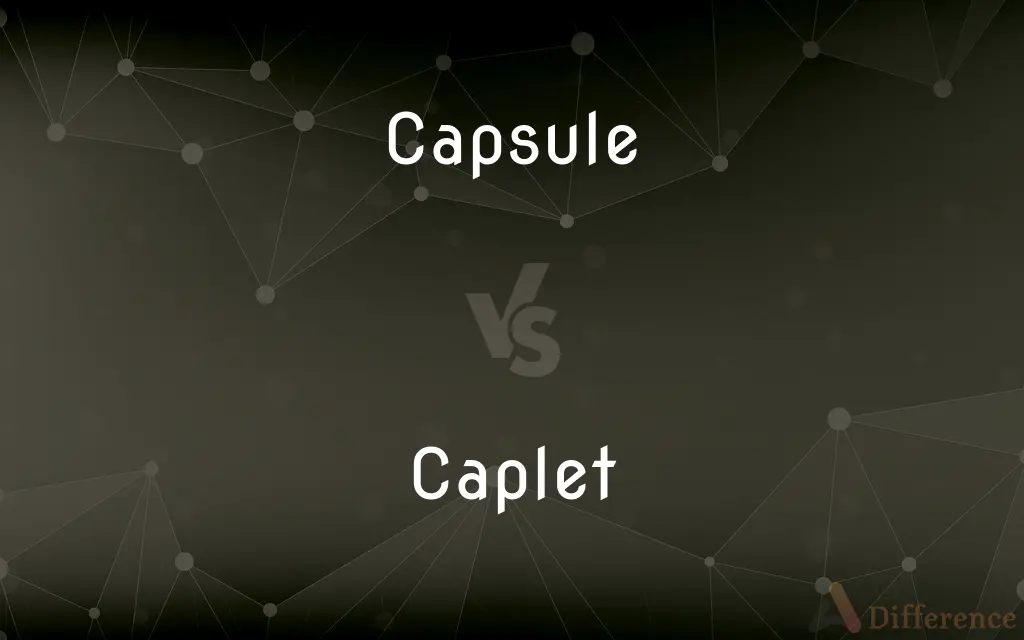Capsule vs. Caplet — What's the Difference?
By Tayyaba Rehman & Fiza Rafique — Updated on March 9, 2024
Capsules are typically cylindrical and consist of two pieces that enclose their active ingredients, while caplets are solid, tablet-shaped, and coated for easier swallowing.

Difference Between Capsule and Caplet
Table of Contents
ADVERTISEMENT
Key Differences
Capsules are designed to encase medication in a gelatin or vegetarian-based shell, providing a means to contain liquid or powder forms of medication. This design helps mask the taste and can make it easier for the medicine to be absorbed by the body. Whereas caplets are a form of tablet that are elongated, coated, and designed to make swallowing easier. They are often preferred for their sleek design, which can facilitate passage through the esophagus.
The shell of a capsule can either be hard or soft, allowing for the encapsulation of various forms of medication, including liquids and powders. This versatility makes capsules suitable for a wide range of medications and supplements. On the other hand, caplets are solid forms that only accommodate powdered medication or supplements, compressed under high pressure to form a dense, smooth, and often coated pill.
Capsules can be more expensive to manufacture than caplets due to the materials (gelatin or vegetarian substitutes) and the process required to encapsulate the medication. Whereas caplets, being more straightforward in their manufacturing process, can be produced more cost-effectively, making them a popular choice for over-the-counter medications.
For individuals with dietary restrictions or preferences, capsules offer an advantage as they can come in gelatin-based (animal-derived) or vegetarian options. Conversely, caplets, due to their composition and coating, might contain ingredients that are not suitable for vegetarians or vegans, though there are exceptions.
The dissolution time and the rate of absorption can differ significantly between capsules and caplets. Capsules tend to dissolve faster than caplets, which means the medication they contain can be released and absorbed by the body more quickly. However, the specific formulation of the caplet's coating can be designed to control the release of medication, offering an advantage in prolonged medication release.
ADVERTISEMENT
Comparison Chart
Form
Cylindrical, two-piece shell
Elongated, tablet shape
Contents
Can contain liquid, powder, or pellets
Primarily powdered medication
Coating
Not applicable (shell itself dissolves)
Often coated for ease of swallowing
Dissolution
Generally faster
Slower, but can be controlled
Dietary Suitability
Offers gelatin and vegetarian options
May contain non-vegetarian ingredients
Compare with Definitions
Capsule
Can be suitable for vegetarians or non-vegetarians based on the shell material.
She chose vegetarian capsules to align with her dietary restrictions.
Caplet
A caplet is a smooth, coated, tablet-shaped medication designed for ease of swallowing.
The pain reliever comes in caplet form to make it easier to take.
Capsule
It masks unpleasant tastes and can release its contents quickly.
He prefers capsules for their lack of taste and rapid effect.
Caplet
Sleek shape and coating improve swallowing, with options for controlled release.
The extended-release caplets provide pain relief throughout the day.
Capsule
A capsule is a small, cylindrical medication container that dissolves in the digestive tract.
The doctor prescribed vitamin D in capsule form to ensure easy absorption.
Caplet
Typically more cost-effective to produce than capsules.
Over-the-counter medications are commonly available as caplets for cost efficiency.
Capsule
Made from gelatin or vegetarian alternatives, it can hold liquids or powders.
The antibiotic was provided in a gelatin capsule to mask the taste.
Caplet
May not be suitable for vegetarians or vegans, depending on the coating.
He checks the label to ensure the caplets are vegan-friendly.
Capsule
Available in hard and soft forms, catering to different medication types.
The fish oil supplements come in a soft capsule that is easy to swallow.
Caplet
Solid, dense, and often coated for easier ingestion.
The coated caplets are less likely to cause nausea than uncoated tablets.
Capsule
A small soluble container, usually made of gelatin, that encloses a dose of an oral medicine or a vitamin.
Caplet
A coated, oval medicine tablet.
Capsule
(Anatomy) A fibrous, membranous, or fatty sheath that encloses an organ or part, such as the sac surrounding the kidney or the fibrous tissues that surround a joint.
Caplet
A smooth-coated tablet pill, as in medicine shaped like a capsule, used as a tamper-resistant alternative to a capsule, or an easy-to-swallow alternative to regular tablets.
Capsule
(Microbiology) A polysaccharide outer shell enveloping certain bacteria.
Caplet
(finance) A component of an interest rate cap, a derivative instrument that effectively prevents the interest payments on an otherwise variable-rate loan from exceeding an agreed level (the "cap"). Each "caplet", analysable as a call option, covers one interest accrual period (such as three months); the whole interest rate cap is made up of a series of consecutive caplets.
Capsule
A dry dehiscent fruit that develops from two or more united carpels.
Capsule
The thin-walled, spore-containing structure of mosses and related plants.
Capsule
A space capsule.
Capsule
A brief summary; a condensation.
Capsule
Highly condensed; very brief
A capsule description.
Capsule
Very small; compact.
Capsule
To enclose in or furnish with a capsule.
Capsule
To condense or summarize
Capsuled the news.
Capsule
(physiology) A membranous envelope.
Capsule
(botany) A type of simple, dehiscent, dry fruit (seed-case) produced by many species of flowering plants, such as poppy, lily, orchid, willow and cotton.
Capsule
(botany) A sporangium, especially in bryophytes.
Capsule
(anatomy) A tough, fibrous layer surrounding an organ such as the kidney or liver
Capsule
(anatomy) A membrane that surrounds the eyeball
Capsule
(astronautics) A detachable part of a rocket or spacecraft (usually in the nose) containing the crew's living space.
Capsule
(pharmacy) A small container containing a dose of medicine.
Capsule
In a brief, condensed or compact form
Capsule
(winemaking) The covering — formerly lead or tin, now often plastic — over the cork at the top of the wine bottle.
Capsule
A small clay saucer for roasting or melting samples of ores, etc.; a scorifier.
Capsule
A small, shallow evaporating dish, usually of porcelain.
Capsule
A small cup or shell, often of metal, for a percussion cap, cartridge, etc.
Capsule
(transitive) To form (medicine, etc.) into capsules.
Capsule
(transitive) To encapsulate or summarize.
Capsule
A dry fruit or pod which is made up of several parts or carpels, and opens to discharge the seeds, as, the capsule of the poppy, the flax, the lily, etc.
Capsule
A small saucer of clay for roasting or melting samples of ores, etc.; a scorifier.
Capsule
A small cylindrical or spherical gelatinous envelope in which nauseous or acrid doses are inclosed to be swallowed.
Capsule
A membranous sac containing fluid, or investing an organ or joint; as, the capsule of the lens of the eye. Also, a capsulelike organ.
Capsule
A metallic seal or cover for closing a bottle.
Capsule
A small cup or shell, as of metal, for a percussion cap, cartridge, etc.
Capsule
A small container
Capsule
A pill in the form of a small rounded gelatinous container with medicine inside
Capsule
A dry dehiscent seed vessel or the spore-containing structure of e.g. mosses
Capsule
A shortened version of a written work
Capsule
A structure that encloses a body part
Capsule
A spacecraft designed to transport people and support human life in outer space
Capsule
A pilot's seat in an airplane that can be forcibly ejected in the case of an emergency; then the pilot descends by parachute
Capsule
Enclose in a capsule
Capsule
Put in a short or concise form; reduce in volume;
Capsulize the news
Common Curiosities
What are capsules made of?
Capsules are made of gelatin or vegetarian alternatives to enclose medication.
Are caplets easier to swallow than tablets?
Yes, caplets are designed to be easier to swallow due to their shape and coating.
Do capsules dissolve faster than caplets?
Generally, capsules dissolve faster, allowing for quicker absorption of the medication.
Can capsules taste bad?
Capsules usually mask the taste of medication, making them taste-neutral.
Why are caplets coated?
Caplets are coated to make swallowing easier and sometimes to control the release of medication.
Can capsules contain liquid medication?
Yes, capsules can encase liquid, powder, or pellets, offering flexibility in medication form.
Can the coating on caplets contain allergens?
Yes, the coating on caplets might contain allergens or ingredients unsuitable for some diets.
Can both capsules and caplets be used for supplements?
Yes, both forms are commonly used for dietary supplements.
How do you choose between a capsule and a caplet?
Choice depends on personal preference, dietary restrictions, and the specific medication's availability.
Can caplets be split in half?
Some caplets can be split, but it's important to check if it's safe for that specific medication.
Are capsules suitable for vegetarians?
Capsules can be suitable for vegetarians if made from vegetarian sources, unlike gelatin-based capsules.
Are capsules or caplets better for children?
It depends on the child's ability to swallow and the medication's form; consult a healthcare provider for guidance.
Which is more cost-effective, capsules or caplets?
Caplets are often more cost-effective to produce than capsules.
Do all caplets have a controlled-release feature?
Not all, but some caplets are specifically designed to control the release of medication.
Are there any vegan options for capsules?
Yes, there are vegan capsules made without animal products.
Share Your Discovery

Previous Comparison
Activist vs. Advocate
Next Comparison
Stratagem vs. StrategyAuthor Spotlight
Written by
Tayyaba RehmanTayyaba Rehman is a distinguished writer, currently serving as a primary contributor to askdifference.com. As a researcher in semantics and etymology, Tayyaba's passion for the complexity of languages and their distinctions has found a perfect home on the platform. Tayyaba delves into the intricacies of language, distinguishing between commonly confused words and phrases, thereby providing clarity for readers worldwide.
Co-written by
Fiza RafiqueFiza Rafique is a skilled content writer at AskDifference.com, where she meticulously refines and enhances written pieces. Drawing from her vast editorial expertise, Fiza ensures clarity, accuracy, and precision in every article. Passionate about language, she continually seeks to elevate the quality of content for readers worldwide.














































